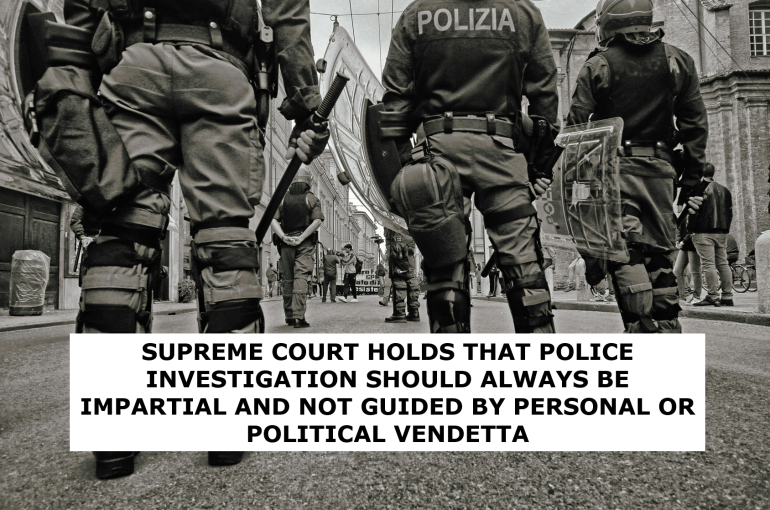SUPREME COURT HOLDS THAT POLICE INVESTIGATION SHOULD ALWAYS BE IMPARTIAL AND NOT GUIDED BY PERSONAL OR POLITICAL VENDETTA
A two Judge Bench of the Hon’ble Supreme Court comprising of Justice B. V. Nagarathna and Justice Pankaj Mithal passed a judgement dated 04.12.2024 in the matter of Kabir Shankar Bose v. State of West Bengal Writ Petition (Crl.) No. 416 of 2020 wherein the Bench held that investigation prejudiced by police and politicians may not be the best course to fair and impartial investigation.
Facts
The Petitioner got married to the daughter of Kalyan Banerjee (Respondent No. 7 herein) in 2010, but the marriage ended by divorce in 2018. Respondent no. 7 was a member of Trinamool Congress Party (TMC). There were allegations of continuous harassment by the father in law of the Petitioner against him even after the divorce was granted to the couple.
On 06.12.2020, the Petitioner’s house was allegedly attacked by TMC workers and goons when the Petitioner was travelling outside his house. The mob tried to attack the Petitioner but was saved by CISF personnel who were deployed for his safety. Many CISF officers were hurt with injuries reported during the attack and altercation.
To the contrary, two FIRs were filed against the Petitioner alleging assault, grievous hurt, and molestation etc., purportedly under political influence. The F.I.R.s dated 07.12.2020 bearing no.400 and 401 of 2020 were lodged against the Petitioner for the offences under Section 341 (Punishment for wrongful restraint), 323 (Punishment for voluntarily causing hurt), 325 (Punishment for voluntarily causing grievous hurt), 326 (Voluntarily causing grievous hurt by dangerous weapons or means), 307 (Attempt to murder), 354 (Assault of criminal force to woman with intent to outrage her modesty), 504 (Intentional insult with intent to provoke breach of the peace), 506 (Punishment for criminal intimidation), 354A (Sexual harassment and punishment for sexual harassment) and 34 (Acts done by several persons in furtherance of common intention) of the Indian Penal Code, 1860 (IPC).
The Petitioner contended that he is an active spokesperson and member of BJP and the Respondent no. 7 who is a member of TMC wanted to settle earlier scores with him. The Petitioner thus filed a Writ Petition under Article 32 of the Constitution for issuing a Writ of Mandamus directing the Respondent authorities to assign the Central Bureau of Investigation or Special Investigation Team, other than the local police, to handle the investigation in the pursuit of the aforementioned FIRs.
The Petitioner alleged bias and lack of a fair investigation by the West Bengal Police due to political and personal vendetta. Moreover, the Petitioner contended the following-
- The FIRs were politically motivated and filed under the influence of Respondent No. 7, a TMC member.
- The local police acted under political pressure, failed to take-action against the attackers, and prevented CISF reinforcements from intervening.
- The Petitioner’s fundamental right to a fair investigation was compromised.
To the contrary, the State of West Bengal and the Respondent no. 7 denied the allegations and contended that the FIRs disclosed cognizable offenses, and the Police were bound to register and investigate.
The Counsel for the State contended that the Petitioner refused to cooperate with the investigation and sought to politicize the matter and denied all allegations of misuse of power and claimed that the Petitioner fabricated the narrative. Respondent No. 7 also argued that the Petitioner bypassed alternative remedies by directly invoking the Supreme Court’s jurisdiction.
Issues
1. Whether the investigation into the two FIRs should be transferred from the local police to an independent agency like the CBI to ensure a fair and unbiased investigation.
2. Whether the politically charged environment in West Bengal and the involvement of the ruling party in the State affect the credibility of the investigation by the local police.
Decision by the Supreme Court
The Hon’ble Supreme Court emphasized that justice must not only be done but also appear to be done. Credibility of investigation is critical, especially in cases involving high-profile parties and political overtones. The Hon’ble Court noted its power to transfer investigations in exceptional circumstances to maintain public confidence, citing precedents such as Rubabbuddin Sheikh v. State of Gujarat (2010) 2 SCC 200 wherein the Hon’ble Court has stated that the Court may turn over the investigation to an impartial organization like the CBI in a suitable situation where it believes the police investigation is not headed in the right direction and in order to ensure full justice in cases involving prominent officials involved in the crime. It should be mentioned that in order to guarantee a fair investigation and trial, Constitutional Courts have the authority to even order more research by another investigating body.
The Hon’ble Bench also noted that the presence of CISF personnel in the incident further complicated the situation, as their actions should not be reviewed by the local police due to potential conflicts of interest.
The politically charged environment in West Bengal, coupled with the Petitioner’s alignment with the BJP (opposition party in the state), warranted an independent investigation to ensure neutrality. Furthermore, the Apex Court provided that due to a stay on the investigation since January 2021, no substantial progress had been made. The Court deemed it essential to expedite the investigation to uphold justice.
At the end, the Supreme Court allowed the Writ Petition, directing that the investigation into FIRs Nos. 400 and 401 of 2020 be transferred to the CBI. The CBI was tasked with completing the investigation expeditiously and proceeding with a fair trial if necessary.
Conclusion
The Court recognized the Petitioner’s apprehensions of bias and emphasized the need for a fair investigation, especially in a politically sensitive case. By transferring the investigation to the CBI, the Court ensured that justice is not only served but also seen to be served. This judgment highlights the judiciary’s role in upholding the rule of law and safeguarding fundamental rights in politically sensitive cases.
ARJAV JAIN
ASSOCIATE
THE INDIAN LAWYER & ALLIED SERVICES





































Leave a Reply